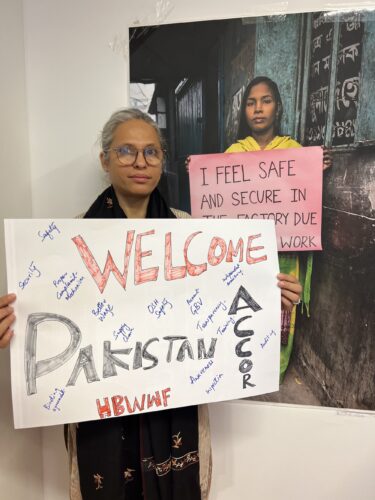- Posted in: Media, Press Release
- Tags: Apparel, Bangladesh Accord, Health and Safety, Worker-driven Social Responsibility
This week marks a historic moment for garment workers in Pakistan. After years of campaigning, the Pakistan Accord, a legally binding, enforceable health and safety agreement between workers’ unions and fashion brands, was announced.
This Accord will provide essential protections for millions of people working in the garment and textile industries–and shows how the Worker-driven Social Responsibility model continues to spread around the globe.
Building on the Success of the Bangladesh Accord
 The new agreement represents an expansion of the Bangladesh Accord, originally signed after the horrendous industrial disaster at Rana Plaza in 2013. The Accord was one of the earliest Worker-driven Social Responsibility programs, pairing binding agreements between brands and worker organizations with the financial capacity for enforcement. Since it was signed, the Accord has transformed the garment industry in Bangladesh. More than 1600 factories have made critical safety improvements, making every day more safe for 2.5 million working people and saving countless lives.
The new agreement represents an expansion of the Bangladesh Accord, originally signed after the horrendous industrial disaster at Rana Plaza in 2013. The Accord was one of the earliest Worker-driven Social Responsibility programs, pairing binding agreements between brands and worker organizations with the financial capacity for enforcement. Since it was signed, the Accord has transformed the garment industry in Bangladesh. More than 1600 factories have made critical safety improvements, making every day more safe for 2.5 million working people and saving countless lives.
The Pakistan Accord builds on the successes of the Bangladesh Accord, now renewed as the International Accord for Health and Safety. The agreement is based on the six essential principles of Worker-driven Social Responsibility. Workers’ unions in Pakistan drove the development of an Accord that:
- The agreement is legally binding for brands who sign on
- Includes time-bound requirements for fixing any hazards and issues.
- Ensures suppliers have the resources to pay for renovations.
- Protects all workers throughout the brands’ supply chain
- Provides workers with the tools to be frontline monitors of their workplaces through confidential reporting of safety and health concerns.
- Includes requirements for documentation and transparency.
187 brands are currently signed onto The International Accord. At least half of those brands are also sourcing from Pakistan, which means that hundreds of factories and fabric mills could fall under the agreement once brands sign on.
Legally Binding Accord Protects Workers Where Corporate Social Responsibility Fails
This updated Accord is timely and essential. More than 250 workers died in the 2012 Ali Enterprises factory fire in Karachi, the worst fire in the history of the global garment industry. As in Bangladesh, voluntary Corporate Social Responsibility programs and auditing systems have failed workers. In 2022 alone, at least 19 people have died on the job, and injuries continue. This agreement has the power to end that.
As members of the Clean Clothes Campaign, one of the international NGOs acting as witness signatories to the Accord, we congratulate this tremendous step forward for workers’ rights, safety, and dignity at work. The Worker-driven Social Responsibility model continues to expand around the globe, from garment factories in Bangladesh to dairy farms in Vermont, from the tomato fields of Florida, now to Pakistan.